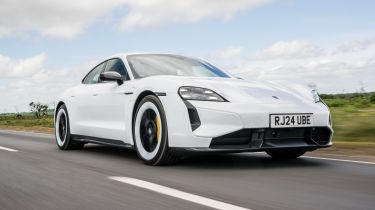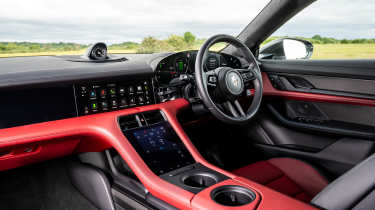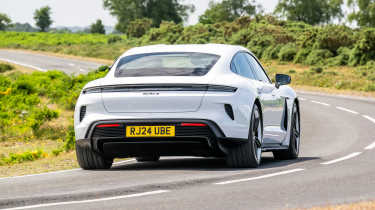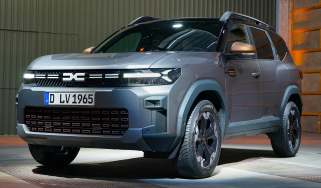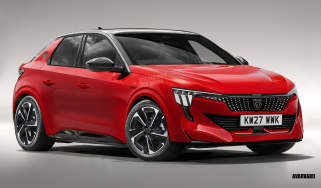New Porsche Taycan Turbo S 2024 review: incredibly fast and seriously expensive
Few cars can accelerate like the new Taycan Turbo S, but only a select few will be able to afford it

Verdict
This side of the world’s most extreme forms of motorsport, there’s little else on four wheels that accelerates as fast as the revised Taycan Turbo S. That it goes even faster than before while improving its efficiency (and therefore range) is an equally impressive feat. However, despite its accomplished chassis, with so much speed on offer we’d like even more feedback and poise. EV buyers looking for a true driver’s car will be better served by the Hyundai Ioniq 5 N, while Taycan fans should save a heap of cash and go for the brilliant entry-level model.
The road test team at Auto Express is in the privileged position of driving some serious performance cars from time to time, so we’re no stranger to supercar levels of acceleration. Even so, when we explored the full performance of the updated Porsche Taycan Turbo S, we still found that there’s a period of recalibrating your brain’s perception of just how quick a car can be.
Engage launch control and mash your right foot into the throttle pedal, and the updated Turbo S will thrust forward the 2.3-tonne mix of metal, glass and white knuckles from 0-62mph in just 2.4 seconds. The slightest hint of correction is needed as all four tyres barely contain torque that is deployed to the road. Understandable, when there’s 1,110Nm of it. No road car really needs this much performance – in fact it’s so fast that experiencing a flat-out standing start more than once in quick succession is borderline uncomfortable – but it doesn’t stop us from admiring what a phenomenal technical feat Porsche has achieved here.
More reviews
Car group tests
In-depth reviews
Long-term tests
Road tests
We’ve already sampled Porsche’s heavily revised Taycan in its base form, and like that car, the changes run much deeper than its staggering straight-line acceleration. While there’s little to distinguish the new model from the outside – a redesigned front bumper being the key change – the cosmetic tweaks hide some fairly significant upgrades under the skin.
As with that model, the subtle alterations to the exterior design hide an electrical system that's received a significant overhaul.
A new battery sits beneath the Taycan’s cabin, and it boasts a net capacity of 97kWh. Although it has a greater capacity than the outgoing model, it’s actually lighter – even if it’s a modest 15kg reduction it is, at least, in the right direction. Cooling systems have received attention, a revised inverter gets updated software, and the rate of brake regeneration has grown from the previous 290kW up to as much as 400kW – that means it uses the mechanical brakes less than before and ensures less energy is wasted when slowing down (thus improving efficiency). There’s also a new heat pump.
For this Turbo S model, it’s the new rear motor which helps achieve that performance. The new unit contributes to a system output that makes a staggering 939bhp – some 188bhp more than the old car, which was hardly a slouch itself. Torque now stands at a planet-twisting 1,110Nm.
But aside from clinging on in a straight line, how should you approach a car with so much performance? Carefully would be the first word that springs to mind. It’s hard to deny that the Taycan has so much of the sophistication that you’d expect from a Porsche, but such incredible speed often requires gentle inputs on a twisty road.
Be too aggressive with the throttle or the steering through a series of turns, and the mix of power and mass means that it’s easier than many might expect to get the car out of shape. And while the steering is wonderfully precise and the body control outstanding, there’s not much feedback from the former and not much roll from the latter – in other words, you don’t get a massive amount of warning about when the limits of grip are about to arrive. You’ll certainly need your wits about you. Dial into its limits, however, and you can keep things smooth through the turns and then fire along any straights at a staggering rate.
Much like the steering, we’d like a little more feedback from the brakes. While there’s enormous stopping power from speed, the calibration during gentler stops needs a little work, as it isn’t always that easy to modulate smoothly. In isolation, it’s still a deeply impressive car to drive, but the arrival of the Hyundai Ioniq 5 N has shown just where the standard now is for electric drivers’ cars.
When we drove the revised base model Taycan, we were staggered at just how efficient it proved to be – it’s genuinely one of the most frugal EVs on sale at any price. With its twin motor set-up – and the temptation that always lingers with so much power on tap – we couldn’t match that car’s easy 4.0mi/kWh-plus return, but the Turbo S still proved to use less electricity than many everyday electric crossovers with one quarter of the power.
For the performance on offer, little else will be so cheap to run. We accept that running costs aren’t likely to be at the forefront of the minds of car buyers with £161,400 to splash out, but it goes to prove just how successful Porsche’s engineers have been with these revisions, anyway.
Elsewhere, the Taycan is much the same as before. The driving position feels lower and more sporty than almost any other electric car, the interior quality is great, if not quite as luxurious as a Porsche Panamera, and it’s also not as specious in the back as Porsche's other GT car. But it’s comfortable, refined and very easy to live with every day. Even more so now, thanks to the revised car’s increased charging speeds; we came very close to achieving that maximum rate of 320kW in the real world – once we found a charger that could keep up.
But we haven’t even come to the most amazing thing about the Taycan Turbo S yet: that this isn’t even the fastest Taycan you can buy now. The Turbo GT with Weissach Pack covers the 0-62mph dash even quicker, in a time of just 2.2 seconds.
| Model: | Porsche Taycan Turbo S |
| Price as tested: | £161,400 |
| Price from: | £161,400 |
| Powertrain: | 2x e-motors, 105kWh battery (gross)/97kWh (net) |
| Power/torque: | 939bhp/1,110Nm |
| Transmission: | Two-speed auto, four-wheel drive |
| 0-62mph: | 2.4 seconds |
| Top speed: | 162mph |
| Range: | 393 miles |
| Charging: | 320kW (10-80% in 18 minutes) |
| L/W/H: | 4,936/1,966/1,378mm |
| On sale: | Now |

